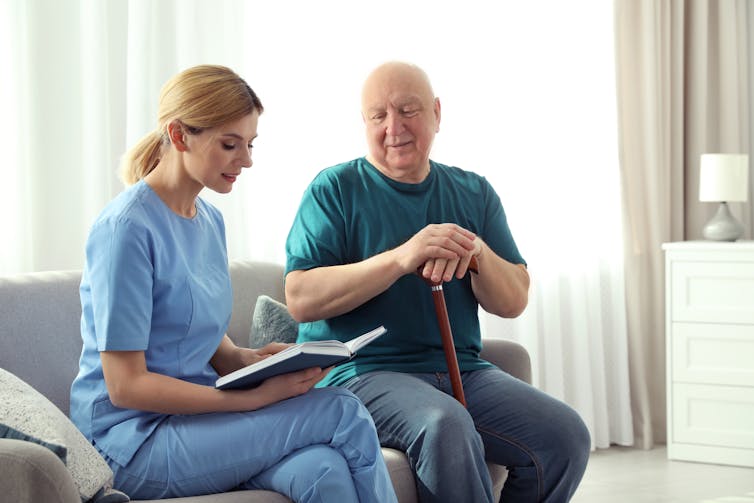Should all aged-care residents with COVID-19 be moved to hospital? Probably, but there are drawbacks too
- Written by Jed Montayre, Senior Lecturer (Nursing), Western Sydney University
COVID-19 is continuing to devastate Victorian aged-care homes, with 1,435 active cases now linked to the sector, and at least 130 residents having died.
The question of whether to automatically move residents with COVID-19 out of aged-care homes and into hospital has divided public and expert opinion.
There are both advantages and disadvantages to consider.
Read more: 4 steps to avert a full-blown coronavirus disaster in Victoria's aged care homes
Different states have different policies
South Australia pledges to send any resident who tests positive for COVID-19 to hospital.
In New South Wales, a resident who tests positive is to be immediately assessed by the facility management, public health and local hospital services to plan the initial response — whether that’s a transfer to hospital or remaining at the home.
Victorian policy is similar. The public health officer responding to an outbreak notification will assess the patient and assist with this decision.
As of the beginning of this week, more than 300 Victorian aged-care residents with COVID-19 had been transferred to hospital. But that leaves a similar number remaining at home.
Certainly no other state is facing the pressure Victoria is to get this response right.
 Different states have different policies on whether to move aged-care residents with COVID-19 to hospital.
Shutterstock
Different states have different policies on whether to move aged-care residents with COVID-19 to hospital.
Shutterstock
What can hospitals offer that aged-care homes can’t?
Specialist treatment
COVID-19 is a serious infection with very high death rates among frail older people.
While aged-care homes can provide a degree of nursing and medical care, hospitals are best positioned to provide specialist treatment and the sophisticated interventions many patients will need.
Better infection control measures
Arguably the key reason to move an infected resident to hospital is to stop COVID-19 spreading to other residents and staff. Aged-care settings are not conducive to infection control in the same way hospitals are.
First, they’re not designed like hospitals. As well as not having the same clinical features, many aged-care facilities follow a “boutique” design with common areas for gatherings and events. Residents and staff can easily congregate in these spaces.
The best efforts to isolate a resident with COVID-19 in aged care could easily be compromised. For example, it’s common for residents with dementia to wander in the corridors. Being contained may exacerbate these sort of behaviours among confused and anxious residents.
More highly trained nurses
Staff shortages in aged care were well documented even before the pandemic. A further depleted workforce during COVID-19 — due to staff off work and restrictions on working across multiple facilities — likely means they’re stretched even thinner. Staff may not always have the capacity to supervise isolated residents or follow infection control procedures.
The much higher ratio of highly trained nursing staff in hospitals should ensure better adherence to the guidelines around proper use of personal protective equipment.
For example, registered nurses in aged-care facilities don’t usually provide direct care to residents. Instead they supervise care provided by unregulated staff often with limited infection control training.
Read more: View from The Hill: Aged care crisis reflects poor preparation and a broken system
What are the disadvantages of hospital transfers?
Older people benefit from carers who know them
The care people receive in aged-care homes relies significantly on staff knowing the residents’ personal and clinical profiles. Aged-care facilities promote person centred care models, which value residents’ rights while striving to create a home-like environment.
Familiar faces who understand residents’ personal preferences may be particularly valuable during a time when residents aren’t able to see their loved ones.
 Residents in aged care develop relationships with staff over time.
Shutterstock
Residents in aged care develop relationships with staff over time.
Shutterstock
Introducing a completely new environment during an illness, particularly for residents with dementia, may do more harm than good.
Limited knowledge about the resident could lead to unmet needs while in hospital, which could trigger behaviours that are difficult to manage.
For older adults with dementia, the likelihood of incidents like falls and infections increases when they’re admitted to hospital.
Read more: Social housing, aged care and Black Americans: how coronavirus affects already disadvantaged groups
The hospital perspective
Importantly, hospitals may not be able to cope with such a large influx of aged-care residents at one time. The rising numbers of COVID-19 cases from the general population, including older adults living in the community, have already put the health system under a lot of stress.
So there’s an argument that if COVID-19 cases can be managed within the aged-care home, they should be, to avert pressure from the hospital system.
Worryingly though, we’ve seen reports of the health department denying requests for aged-care residents with COVID-19 to be transferred to hospital.
Respecting autonomy and the right for care
On balance, as much as possible, it’s probably be better to transfer residents to hospital as soon as they test positive to COVID-19. This offers the best chance of preventing widespread infection among other residents and staff, and disease spread from the home into the community.
But we must also respect residents’ autonomy. They might have requested not to be transferred to hospital, even if their illness is life-threatening, by way of an advanced care directive. This might still be their wish, or the preference of their relatives and decision-makers.
Conversely, residents or their surrogate decision-makers might request hospital care, even when care is possible within the home. Again, we argue this is their right.
We should also allow people to change their minds, as these decisions may have been agreed upon before the pandemic.
Authors: Jed Montayre, Senior Lecturer (Nursing), Western Sydney University



















